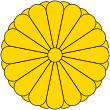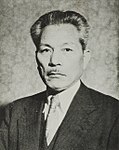| |||||||||||||||||||||||||||||||||||||||||||||||||||||||||||
All 467 seats to the House of Representatives of Japan 234 seats needed for a majority | |||||||||||||||||||||||||||||||||||||||||||||||||||||||||||
| |||||||||||||||||||||||||||||||||||||||||||||||||||||||||||
| |||||||||||||||||||||||||||||||||||||||||||||||||||||||||||
 |
|---|
| This article is part of a series on the politics and government of Japan |
General elections were held in Japan on 21 November 1963. The result was a victory for the Liberal Democratic Party, which won 283 of the 467 seats. [1] Voter turnout was 71.1%.

Japan is an island country in East Asia. Located in the Pacific Ocean, it lies off the eastern coast of the Asian continent and stretches from the Sea of Okhotsk in the north to the East China Sea and the Philippine Sea in the south.

The Liberal Democratic Party of Japan, frequently abbreviated to LDP or Jimintō (自民党), is a conservative political party in Japan.



